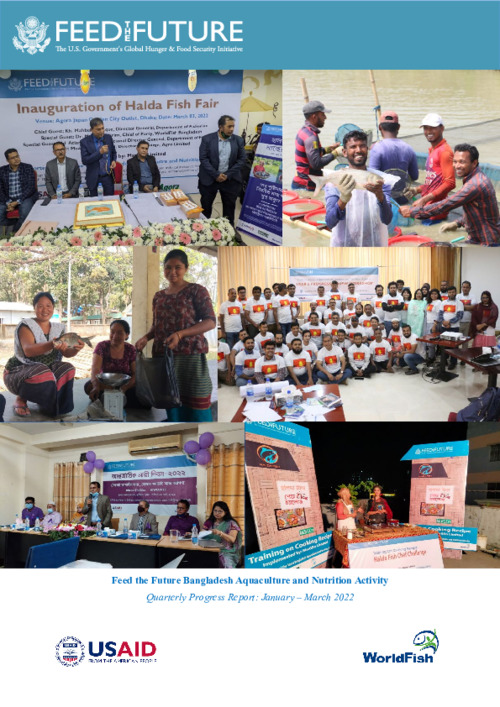USAID_Feed the Future Bangladesh_Quarterly Progress Report_Jan 2022 - Mar 2022

The Feed the Future Bangladesh Aquaculture and Nutrition Activity (Aquaculture Activity) is a USD 24.5 million, five-year assistance program, awarded to WorldFish on February 6, 2018, which is expected to continue until February 5, 2023. Aquaculture Activity aims to improve the livelihoods of at least 400,000 beneficiaries, including smallholder fish farmers and other actors in the aquaculture value chain. The interventions put emphasis on cross fertilizing knowledge, and sharing expertise so that the skills of the actors are developed, facilitating sustainable growth in the market. The Activity is being implemented by engaging partners from both private and public sectors located at 21 south-western districts and 2 south-eastern districts of Bangladesh, which are known as Feed the Future Zone of Influence (ZOI) and Zone of Resilience (ZOR), respectively.
A key activity that has started to yield results this quarter is a large scale study undertaken by the program to investigate and document evidence of systemic change that has occurred as a result of its facilitation work in the aquaculture value chain. The study is being conducted at three different tiers: (1) implementing partners (IPs), (2) service providers and agents, and (3) farmers/beneficiaries. The first stage of the study, consisting of the IPs, has been completed and it is revealed that 63% of the IPs were satisfied with the changes they integrated in their business models with support from Aquaculture Activity, 30% were highly satisfied and 9% were moderately satisfied. None of the partners said they were dissatisfied with the performance of the intervention. Highest percentage (54%) of IPs said that their customers were satisfied with the service they extended while 41% were highly satisfied and the rests (4%) were not fully satisfied. All the partners confirmed that the intervention introduced some kind of innovation/transformation to their business, while 72% said that they have made autonomous changes to their business model since it was piloted with Aquaculture Activity assistance (Annex 1). This is an important indicator of systemic change, showing that the private sector partners are taking ownership over their business model and are likely to continue with them without further support from Aquaculture Activity. This study is therefore indicating the effectiveness of a Market Systems approach to strengthening the aqauaculture sector in Bangladesh.
A significant and evolving challenge to the continuing success of all program work has to be the impact of the ongoing war in Ukraine on the cost of food, fuel, and raw materials, particularly agricultural inputs. In poor households, the purchase of such items consumes most available income, and so, with little if any savings or affordable credit available to families in rural aquaculture communities, their resilience to these economic shocks will be very limited. As most of Aquaculture Activity’s work involves supporting more effective commercial interaction between the private sector and aquaculture farmers it is likely that this will be impacted by these challenges of higher commodity prices, and so the program will continue to closely engage with its partners to understand any need to re-focus activities in response to such pressures. For example, it may be pertinent to review training materials for farmers to support the use of less expensive locally produced feed rather than continuing to drive adoption of commercial products which may be becoming unaffordable in a market where consumer demand for fish will also be impacted by the same factors of price inflation. In the next quarter, Aquaculture Activity will continue to leverage on its knowledge of the aquaculture value chain in order to respond where necessary to the effects of this conflict on beneficiaries’livelihoods
Permalink
Date Available
Type
Countries
Copyright
CC-BY-4.0
Research Themes
Language